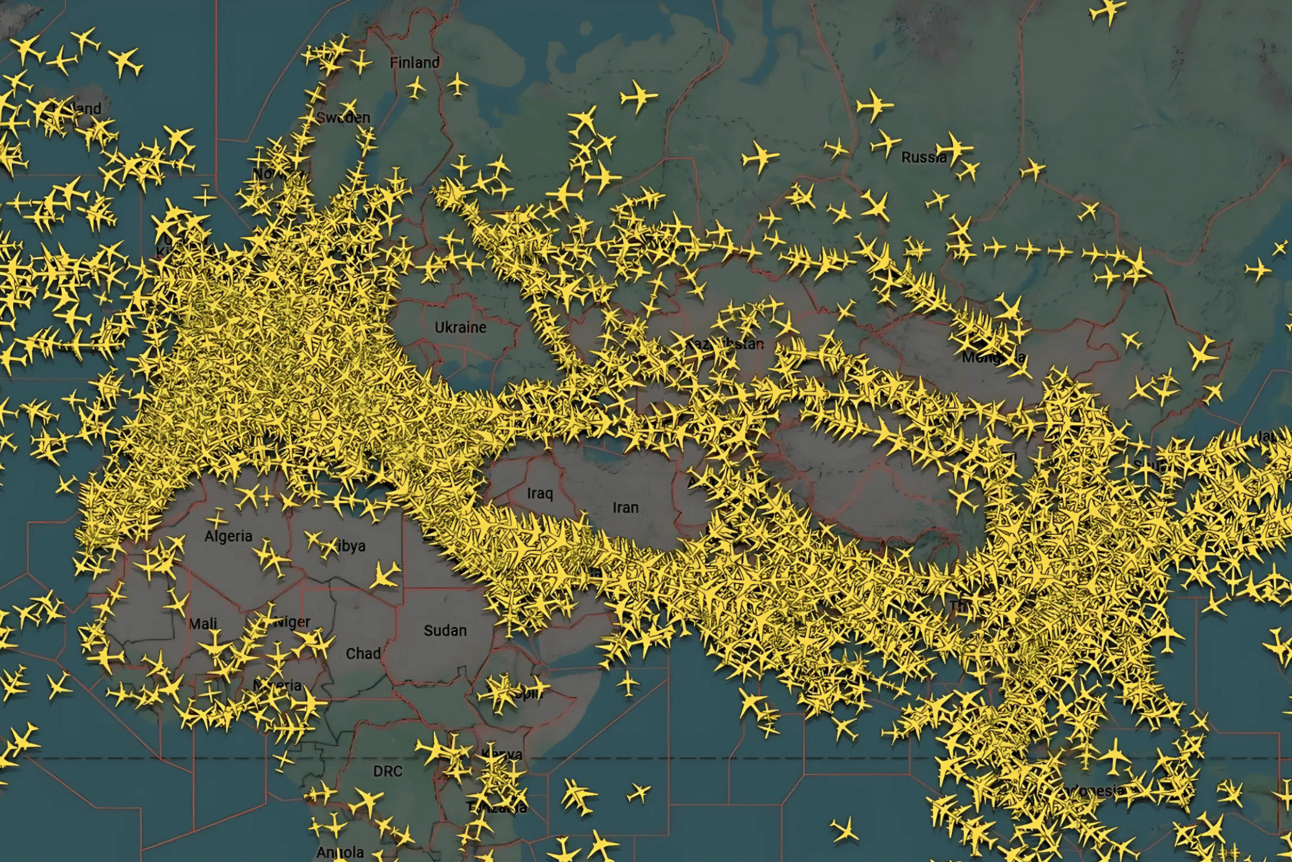
UN may no longer monitor Iranian nuclear program

Maxar Technologies
Iran claims its nuclear program is “peaceful” in nature. After Israel and the US targeted Iranian nuclear sites, the nation’s parliament voted this week to halt its cooperation with the International Atomic Energy Agency (IAEA).
Once approval from Iran’s 12-member Guardian Council and Supreme Leader Ali Khamenei is obtained, the law would prevent IAEA inspectors from visiting nuclear sites unless specifically authorised by Iran’s Supreme National Security Council.
Why end cooperation?
Iranian lawmakers accused the IAEA of bias, claiming it failed to condemn recent strikes by Israel and the US on Iranian nuclear facilities.
However, a leaked IAEA report earlier this month found Iran had built up its nuclear stockpile in secret, which could be a motivating factor:
The report (see previous newsletter) found Iran had amassed over 400 kilograms, or 8,800 pounds, of uranium enriched to 60% purity, enough to make 11 nuclear bombs.
None of the nuclear materials used at the locations were reported to the IAEA, which alarmed Western nations and eventually led to the strikes on Iranian nuclear facilities.
The move comes after a wave of airstrikes by Israel and the US targeted Iranian nuclear sites, with Tehran claiming its facilities were only set back by months, though the claim has since been disputed.
How much damage was done?
There’s debate over how much damage the US strikes did to Iran’s nuclear program. President Trump says they pushed Iran’s nuclear plans back by decades—but a leaked US intelligence report paints a less dramatic picture, estimating only a few months’ delay.
On Wednesday, CIA Director John Ratcliffe said that credible intelligence suggests recent US airstrikes “severely damaged” Iran’s nuclear program, with several key sites reportedly “destroyed.”
Regardless, parliament speaker Mohammad Bagher Ghalibaf said Iran would continue its nuclear program at a “rapid pace” unless its facilities were guaranteed security.
Looking forward: Trump said he plans to meet with Iranian officials next week but stressed that a deal isn’t required to weaken Iran’s capabilities. Meanwhile, Iran claims it relocated its uranium stockpile before the strikes and now intends to speed up enrichment, insisting its nuclear program remains peaceful.

Global conflicts are leaving gaps in key air travel routes

FlightRadar24 via X
To be fair, I wouldn’t want to fly over Iran either. Airlines are increasingly rerouting flights to avoid conflict zones—from the Middle East to Eastern Europe—creating longer, more costly journeys for travellers.
Conflict hotspots
Recent missile activity in the Middle East, especially around Iran and Israel, has forced carriers to shift routes, leaving passengers to bear the brunt of increased costs due to longer, more fuel-intensive flights.
A look at FlightRadar24 (see live map) shows an absence of planes over Israel, Iraq, and Iran, as airlines cancel flights amid rising regional tensions.
Similar detours are happening near Ukraine and western Russia, where the ongoing war has made large areas of airspace off-limits since 2022.
Now, airline carriers are relying on government advisories and real-time risk assessments more than ever to keep passengers and crew safe. See an overview of how it works here.
Resuming service: As a fragile Israel–Iran ceasefire took effect this week, some airlines cautiously resumed regional service, causing European and US airline stocks to see sharp gains.
Flying blind
With the above information in mind, flying around missiles (believe it or not) isn’t even the worst of it. Pilots are now having to deal with less reliable navigation systems, too:
Conflicts like the war in Ukraine have disrupted GPS signals and radar tracking, making it harder for pilots to know exactly where they are or what’s ahead.
Aircraft are often subject to a military tactic called “GPS spoofing,” which causes radio transmitters to override GPS signals, tricking them into showing a false location.
GPS spoofing isn’t a small problem. Data from the international aviation network Ops Group indicates a 500% rise in spoofing incidents in 2024, with approximately 1,500 flights affected daily.
Warzones have only gotten bigger: Estimates suggest a 65% increase in war-torn regions since 2021, an area nearly twice the size of India, with ongoing conflicts in Ukraine, the Middle East, Myanmar, and central Africa.

The world’s largest camera captured a never-before-seen view of the cosmos

Vera C. Rubin Observatory
I mean, a big universe needs a big camera. Using the largest digital camera ever constructed, the Vera C. Rubin Observatory has released its first images, revealing a stunningly detailed view of the galaxy.
Cosmic snapshots
The observatory, backed by the National Space Foundation and the Department of Energy, is equipped with a telescope that features the world’s largest digital camera and a nearly 28-foot-wide mirror.
Those two features let it gather vast amounts of light, allowing it to observe objects billions of light-years away in sharp detail.
In just seven hours of observations, the camera took 678 pictures of deep-space wonders, including the Trifid and Lagoon nebulae and a panoramic view of the Virgo Cluster (see images here).
Each image covers an area equivalent to 45 full moons in the sky and contains billions of pixels—you’d need 1,600 large TVs to see one in full detail. Not to mention, these celestial objects are thousands of light years away. A light year is nearly six trillion miles.
We get it, the camera is powerful. But it didn’t stop there:
After three more hours of observations, Rubin identified over 2,100 previously unknown asteroids, none of which pose a threat to Earth.
Looking ahead: Later this year, the Rubin Observatory will begin scanning the southern sky each night for the next 10 years, creating a massive time-lapse of the universe. The mission should uncover more about dark matter, track black holes in real time, and identify millions of new celestial objects.
Help Us Keep NextGen News Running
Learn something new today? If you find value in what we do and enjoy getting non-biased, fact-based, independent reporting, it would mean the world if you would consider supporting us.
We don’t have deep-pocketed sponsors or shadowy billionaires funding us (unlike other media outlets). Instead, we rely on readers like you to keep the lights on and the news flowing into your inbox.
Support us! If you’d like to keep independent media alive, please consider donating to our Ko-Fi below, even $1 is greatly appreciated.
P.S. All you have to do is click this image right here 👇

Florida led the largest rescue of missing children in US history

Facebook / Florida Attorney General James Uthmeier
Dozens of children were saved from their captors. Over two weeks, the US Marshals Service and more than 20 law enforcement agencies across Florida led “Operation Dragon Eye,” in what officials are calling the most successful child recovery operation in US history.
A massive child rescue
Authorities say the initiative was the product of a “multidisciplinary task force of federal, state, and local government agencies.” Operation Dragon Eye resulted in 60 "critically missing" children in the state—aged between 9 and 17—being located and safely recovered.
Among the rescued were children at heightened risk, some facing substance abuse, exposure to violence, and exploitation, which prompted concern for long-term safety and well-being.
During the operation, eight individuals were arrested and face charges related to human trafficking, child endangerment, drug possession, and custodial interference.
Officials say the suspects were connected to broader criminal networks preying on vulnerable children and that investigators are now looking to find whether those networks operate beyond Florida and are pursuing charges against higher-level organizers.
What happens to the kids? The children were quickly provided with medical evaluations, psychological care, social services, nourishment, and advocacy, intended to ensure they’re not repeatedly placed in dangerous situations.
Looking forward: In response to the volume of missing-child reports, Florida has boosted funding, allocating nearly $5 million for emergency shelters and services to support vulnerable youth and those tied up in trafficking networks.

Your credit score will now be affected by ‘Buy Now, Pay Later’ loans

Shutterstock
That Big Mac I’ve been paying off is about to hit like a truck. FICO, the company that calculates credit scores, announced it will begin factoring in Buy Now, Pay Later (BNPL) borrowing into its credit scoring formula starting this fall.
It’s already later
BNPL services, which let consumers split purchases into four interest-free installments, have become wildly popular and are now being seen as a meaningful part of financial behavior.
While they previously had no impact on credit scores, unlike traditional borrowing, the change offers lenders deeper insight into repayment habits, but stops short of making it mandatory:
Only BNPL providers who share data and lenders who adopt the model will see the impact.
Is it a blessing or a curse? Well, that depends on who’s borrowing. FICO says the change could benefit consumers who consistently repay BNPL loans—particularly those with thin credit histories—but may negatively impact the scores of those who’ve missed payments.
How did you like today's newsletter?
FAST FACTS
Catch up on this week’s weird news

GIF via GIPHY
Plastic Promise: Turns out your empty water bottle could cure your headache—researchers at the University of Edinburgh have engineered E. coli bacteria that turn plastic waste into acetaminophen, the key ingredient in painkillers like Tylenol.
Syringe Stabbings: French police arrested 12 suspects after 145 people—mostly teenage girls—reported being pricked with poisoned syringes during a nationwide street music celebration.
Red Wedding: Jeff Bezos's three-day Venice wedding with wife Lauren Sánchez is expected to cost up to $74 million, and with 80% of the wedding provisions sourced from Venetian vendors, it is also expected to boost the local economy.
Herpe Health: New Zealand’s cheeky public‑health campaign, “the best place in the world to have herpes,” won the Cannes Lions Health award, using humor and a retro tourism-style video to defy stigma around a condition affecting up to 80% of Kiwis.
Rural Resurgence: Amazon plans to roll out same‑day and next‑day Prime delivery to more than 4,000 smaller towns and rural communities across the US by the end of 2025, part of a $4 billion push to expand its network.






